#trauma therapy
Photo

Illustration from last year on trauma therapy, for Dutch newspaper Trouw.
#editorial illustration#illustration#trouw#trauma therapy#emdr#drawing#psychology#artists on tumblr#chuanmingong
2K notes
·
View notes
Text
Emotional Regulation- what's it all about?

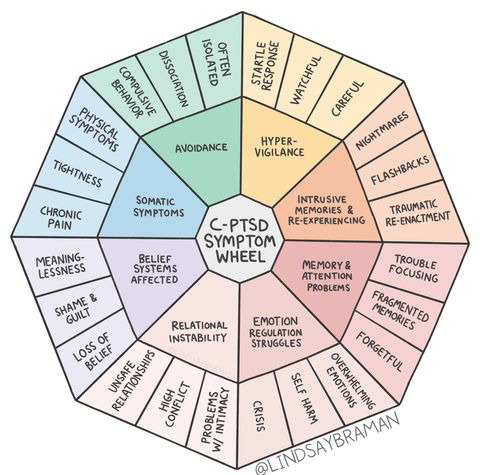
Emotional regulation is the work of releasing pent up stress from your nervous system.
Your body has an entire system of automatic stress responses. Some of which can be born out of hard wired prolonged exposure to trauma in our childhoods.
With no proper regulation from our abusive & neglectful parents, many of us are still stuck in these same fear responses from our childhoods. Which means a lot of that fear, sadness, guilt, and shame, reappears in the form of how we cope now as an adult.
By learning how to recognize which state of survival you're in- and you can be in all states at different times and triggers- you can then work on giving your body a more directed route to releasing the pent up exhaustion, fear, tension, and panic.
Which in turn gives us more room to breathe easier when we are feeling stress, panicked, and triggered.
There are many techniques to help with emotional regulation. Somatics is the practice of moving your body to release the energy.
This is why everyone will scream yoga and exercise at you. But its not just limited to those two types of movements.
If you are bed bound, somatics can be as simple as raising your arms, lifting your legs, and rolling your neck.
The key idea is to recognize when you're overwhelmed, panicked, and triggered in your day to day life. Work real hard on bringing these moments into your awareness. What are your thoughts like? What are your reactions?
From there we work to integrate a basic somatic framework over time. This can look like working hard to incorporate some form of comfort, movement, and acceptance for the physical discomforts of these moments.
A basic framework can include:
Butterfly hugs (put ur hand over ur heart)
Self hugs
Hold your shoulders
Rub your shoulders, arms, tummy, and legs
Lift ur shoulders, shake ur arms, clench ur fists
Wiggle in ur seat
Raise ur legs, stomp your feet gently in place, roll ur ankles
Deep breathing
Groaning, sighing, screaming, making noise
Humming or singing
Outwardly showing emotions on your face
Cold/warm compress or towel
Weighted blankets or comfort items
Sensory stems
These are just a few examples. You can literally do whatever types of movements that feel natural for you.
The secondary idea of emotional regulation is self expression.
That's why it's okay to groan and scream and be loud and expressive in these moments, if you need to. Remember that most often panic attacks, stress, anxiety, and triggers are deeply emotional responses to very personal scenarios and traumas that we have endured in our past. Some of these fears stem from some really scary places. It makes a lot of sense that you might need to scream, cower in fear, or use facial expressions in these moments.
Oftentimes in abusive environments we are restrained from doing so by our abusers. When in reality, these are the standard reactions for what we went through. These are the types of reactions that our bodies are repressing.
It can feel overwhelming to think about acting in such ways, especially if you're not able to practice these in peace, solitude, and safety. But please know that how you cope is an extremely personal and extremely precious part of who you are. Do whatever you need to do for your health and safety and stability and peace of mind. That should be the main goal.
One last thing about emotional regulation to remember, is that the goal is to not be "happy" or at a "peaceful baseline" all the time.
The goal is to allow the anger, allow the sadness and grief and all other emotional signals in-- and then express them in healthier ways than what you're doing now.
Because at the end of the day, groaning and pitching an intended hissy fit in the privacy and safety of your own home, is a much better and healthier way to cope than hurting yourself.
Allow your inner teen the proper emotional outlets your parents stole from you.
This is the work of emotional regulation.
[self regulation chart source- primaltrust-official]
"The Autonomic Nervous System (ANS) communicates to us through our feelings and our sensations in the body. By learning how to recognize our ANS states, we can become better equipped with knowing what we can do to help ourselves in times of discomfort or distress.
Many people are aware of the fight/flight state, but there is often confusion with freeze and shut down states, which are actually different.
Dorsal vagal shutdown is a state of parasympathetic collapse, and because of this, a little movement and stimulation of the vagus nerve (since this nerve governs the parasympathetic response) is helpful. On the other hand, a freeze state is a mixture of sympathetic and parasympathetic (the dorsal vagal shutdown) immobilization, which to our nervous system is like having a foot on the gas and a foot on the brakes at the same time. In this state, the nervous system needs to be shown safety, so it can come out of paralysis, relax and then move energy as needed.
A telltale physical sign of being in freeze is having very tight, sore muscles, or noticing you are 'bracing' in your body, as if preparing for impact. Panic attacks can also occur in the state, which is a step beyond the anxiety experienced and fight/flight.
The aim of all the suggested exercises in this post is to help the body come into a healthy (not dorsal vagal shutdown!) parasympathetic state- ventral vagal- but to get there, you might journey from freeze to fight/flight for example, or dorsal vagal to fight/flight. This is very normal and can be explained wonderfully by the Polyvagal Ladder (see the teachings of Deb Dana for more). The goal is to not be in ventral vagal all the time. Our nervous system is highly intelligent and will flow between states as needed, thus the aim is to allow this flow, versus getting stuck in any shut down, freeze, or fight/flight state for too long."
[C-PTSD symptom wheel source- Lindsay Braman]
"This new C-PTSD symptom wheel resource is a tool for education and for advocacy.
The World Health Organization's diagnostic criteria for Complex Post-Traumatic Stress Disorder are split into 8 distinct categories. These categories were mapped by Dr. Wei-May Su and Dr. Louise Stone in an Australian medical journal in 2020. Simplifying and then building off their work* to highlight specific ways these symptom categories show up in a survivor's life, I've created this radial chart showing how the constellation of symptoms experienced by survivors of complex trauma can be organized under the heading of C-PTSD.
I often avoid creating art that can be used for diagnosis or self-diagnosis, but the fact is, resources and awareness are desperately needed on the topic of C-PTSD. See, although it has been recognized by the World Health organization since 2020, the USA's diagnostic manual, the DSM-5, doesn't include C-PTSD. Because it's omitted from the DSM, many therapists aren't trained to recognize it or treat it. Insurance won't cover treatment, and too often people get misdiagnosed and given ineffective treatments.
Historically, mental health providers haven't done a great job of understanding and categorizing experiences of complex trauma survivors, but through education and advocacy, we can change that."
🌸🌸🌸🌸🌸🌸
Hope this helps
🌸🌸🌸🌸🌸🌸
#recovery#ptsd#trauma#mental health#boundaries#healing#healing thoughts#cptsd#actually traumatized#trauma awareness#trauma informed#emotions#bpd#actually borderline#mental health resources#resources#emotional regulation#dbt#somatics#trauma therapy#self help#self care#anxiety#depression
69 notes
·
View notes
Text

When I was in counseling as a kid and even going through cognitive behavioral therapy, I thought I was doing everything I could to heal. The truth is that I was only treating the symptoms of my unhealed trauma and unresolved feelings: anxiety, stress, emotional outbursts, destructive behaviors, and so on. I wasn't being taught how to feel, express, and release my emotions; I was being taught how to understand my past experiences, think about them differently, and rationalize my way to functioning. This is known as intellectualization: a coping mechanism wherein reasons and logic are used to avoid the discomfort that comes with genuine feeling.
#wellness#mental health#therapy#healing#wellnessjourney#growth#emotional release#emotional healing#emotional freedom#emotional health#emotions#expressing emotions#trauma healing#trauma#trauma recovery#trauma therapy#wellness blogger#wellness blog#emdr#emdr therapy
93 notes
·
View notes
Text
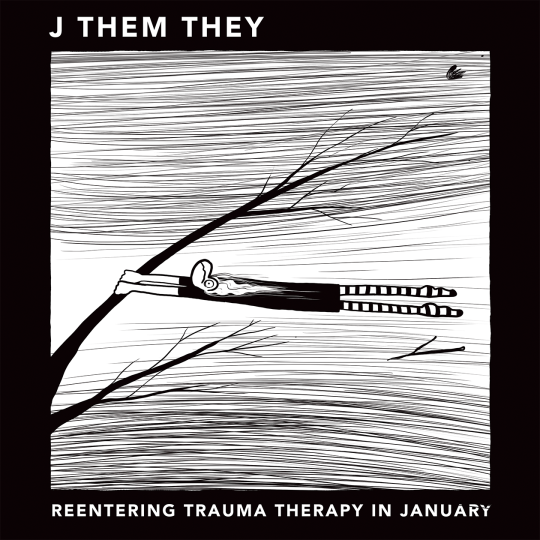
Can I just say something?
Trauma therapy has helped me more than any other kind of therapy.
A (naturally occurring) forest fire is important for growth. The fire removes dead trees and rot. It spurs evergreens and sequoias to release seeds. As new forest plants sprout it feeds a multitude of animal life.
These slice-of-life cartoons were always meant to be mostly funny and whimsical, but I had to include this.
We all survive Traumatic events, the Trauma is what remains after. If you don't let it out, it stays in the body. It manifests in countless ways, none of which I was consciously consenting to.
My favorite writers on the subject are Gabor Mate and Clementine Morrigan.
And I'll be making celebratory illustrations each time I make it through a session, which I'll attach to this post.
Thanks for reading, and most especially, thanks for healing!
-J
404 notes
·
View notes
Text

Stinky Bear Motivation! Today is a good day to feed your inner child ☺️ ☺️ ☺️ ☺️ ☺️ ☺️ ☺️ ☺️ ☺️ ☺️
🌈💐🧸🏎️🎁🪀🧃🍔🍕🍨🎠🧩
❌[p0rn/kink blogs DNI]❌
✅[SFW agere is okay to reblog]
#trauma#mental health#inner child#recovery#ptsd#cptsd#boundaries#fun#agere#age regression#trauma therapy#healing#inner child healing#teddy bears#gogurt#yogurt#kidcore#aesthetic#kidcore aesthetic#traumacore#health#self care#affirmations#positive affirmations#soft affirmations#positivity#warm affirmations#soft positivity#reminders
76 notes
·
View notes
Text
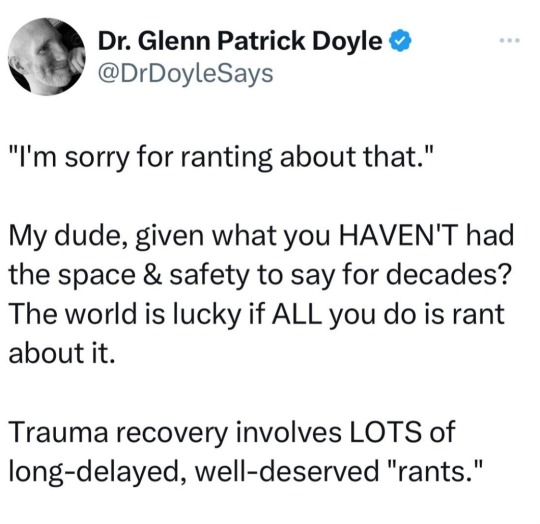
I'm so thankful that my therapist encourages me to write letters to my abusers, even if I'll never send them.
#trauma recovery#post traumatic#complex post traumatic stress disorder#c ptsd#tw cptsd#traumatized#post traumatic stress disorder#trauma#my childhood#borderline personality disorder#actually bpd#borderline problems#bpd problems#being borderline#actually borderline#bpd#bpdprobs#actuallymentallyill#bpd feels#traumatic childhood#trauma therapy#therapy#vent#let the healing begin#healing my inner child#fuck you ptsd#ptsd recovery#complex ptsd#ptsd#actually ptsd
33 notes
·
View notes
Text
Things I didn't realize would happen as I started trauma therapy
To preface, this is written by Vivian (he/him), the current "main" host of the Many but One system. I am a trauma holder for childhood and teen trauma, but I am also highly functional despite this due to the fact that most of my really severe trauma is even further compartmentalized--I am one of those "alter with alters" type of subsystems.
So, this post is going to explain some of the things I didn't realize would happen to me, Vivi, as I progressed in trauma therapy.
I had to re-learn how to say "no." This was very hard to do in the beginning. My entire "purpose" was very heavily focused on "just let it happen, just let it happen, it'll be over soon" regardless of what the actual circumstances were. Even in a non-SA environment, I found it difficult to say no to people or to remove myself from situations I felt were uncomfortable. When my therapist helped me realize that I had CHOICES and could make them freely (within reason) that was...seriously mind-blowing. Intrinsically, I know that I am allowed to say no. I know that I can make my own choices. However, when faced with the actual situation or if I think too deeply about the freedom I have I actually lose my fucking mind just a little bit. It's like my internal wiring is so deeply set to "NO! You sit there and you take it, it doesn't matter how uncomfortable you are, you just let it happen." Going against such deeply ingrained beliefs about myself has been a doozy, but it's been such a relief to finally have some freedom from those lines of thinking.
I am not as apathetic and hateful as I thought I was. Don't get me wrong, when I get into a "mood" I can definitely be this way, however, upon working on healing myself I realized I actually, genuinely, enjoy helping people or taking care of them. I was never like this before because I was so deeply focused on keeping MYSELF safe, that I didn't even have the capacity to think or care about others. I was incredibly self-centered, and not in a bad way, in a survival way.
I don't have to let myself suffer all the time. If my body hurts I can take care of it. If I am hungry, I am allowed to eat. If I am uncomfortable in any given scenario, I can leave. I don't have to "just suffer through it." Suffering is not a virtue, and it doesn't make me stronger. It only makes me weaker.
People aren't as bad as I thought they were. From my limited experiences in the external world as a child and teen, every single interaction I ever had with someone was typically highly traumatic. Such is the way of a trauma holder who kind of "specializes" in the SA side of things. So as you can imagine, becoming a host and having to interact with people on a daily basis made it very hard to trust anyone around me. However, the more I interact with genuinely good people, the more I realize that "Humanity is Okay, actually." Yeah there are some really fucked up people, like our abusers, but there is so much genuine GOOD out there, and having my walls up at every second made it literally impossible to even see it. Learning how to trust and be vulnerable is still something I am working on. But I am doing it, and it hasn't backfired yet. Knowing who to trust has been hard because I typically just go "NOBODY," or at least, I used to. So I am very careful about who I put my trust in, and it has paid off immensely.
I am a genuinely good person, even when I do "bad" things. When I say bad things, I don't mean abusing others or things of that nature. But moreso, things that myself, our system, our brain, has ingrained in us as "bad." Such as coping with negative coping mechanisms (alcohol, drugs, impulsive spending, self harm), engaging in trauma reenactment scenarios, or being overly reactive (or the opposite, apathetic) to others around me. Just because I relapse into bad behaviors doesn't automatically make me a bad person, that just makes me human. And thinking that I'm going to get through this hell called "Trauma Therapy" without relapses is just ridiculous. Being kinder to myself has been a good step.
I am allowed to make mistakes. Kind of with the above, mistakes don't automatically mean I need to punish myself for making the mistake. Making mistakes is part of life, no matter how big or small they are. Showing myself grace when I do these things has been life-altering.
I am a human being. This one is kind of sad. A lot of our trauma holders feel very detached from being a person, including myself. A saying we have to remind ourselves of constantly is "We Are Human." We are a person, not a thing, not a demon, not a monster, not a faerie, not a statue, not a robot, not a doll, not an angel, not a god. We are human, and we deserve to be treated with the kindness and grace of one. That is the LEAST we deserve, is to be treated like a human. Unfortunately that has not been the case for a lot of our lives. But things are different now. And we are finally starting to understand that.
I don't have to live with one foot in trauma time and one foot in the present. This might be a bit confusing, but something our therapist noticed with a lot of us is that we often have one foot in the present and one foot still in trauma time. We often feel like we have to hold on tight to those experiences. During trauma anniversaries, we HAVE to relive them, that's our job. This may just be a personal system experience, but we didn't get closure when the trauma ended, so we never knew when it would happen again. There are so many parts in our system that are so sure it's going to start again even though it ended 15 years ago. They are still certain that "this year is different, this year they will come for us" which leaves us panicked and paranoid. Something we did to cope was essentially relive the trauma or reenact the trauma internally during those trauma times because we were so used to being traumatized the same ways all the time at the same times of the year, that when we suddenly weren't, we panicked. However, in therapy we have slowly started learning that the cycle is OVER and we don't have to live like this anymore. It's so hard. But we are making it work.
I hope by sharing these few things it will instill maybe a little bit of hope for those of you who are working through trauma therapy. I truly never thought I would be where I am today. I was considered one of our most self destructive persecutors for a long time, I would burn every bridge I could to keep people away from me, I would self harm and drink alcohol excessively, I would be reckless and impulsive to the point where there were many times that our gatekeepers had to frantically yank me out of the front so that I wouldn't end our life. The levels of pain I felt (and still very often feel, I am not "healed" yet) were so fucking immense that I just didn't want to be here anymore. But seeing where I came from versus where I am now has given me a lot of hope for where I could be in the coming months and years. I don't think I've ever truly had hope for the future, but now I am at the very least curious what it will bring. I think even just a mere curiosity is enough. You don't have to be excited for what is to come. Simply being curious is good, too.
I hope you all have a blessed day,
🪷Vivi👑
Many but One
#vivian🪷#did osdd#manybutone#trauma therapy#trauma treatment#trauma recovery#therapy#dissociative identity disorder#otherwise specified dissociative disorder#cdd#odd#did#actually did#actually traumatized#traumagenic#traumagenic system#dissociation
259 notes
·
View notes
Text
When I say you look pretty today, I'm literally picturing my hand slapping that pretty face multiple times.
38 notes
·
View notes
Text
Your Words Matter
Dear Therapists,
I had just logged into a Zoom session for my Diagnosing Pathology class and my cohort was in deep discussion with one particular student as we all waited for our professor. This student in particular was already working in some sort of clinical setting, not yet giving therapy, but a new client profile had come across her desk with a diagnosis of borderline personality disorder. She didn’t know much about the diagnosis herself, but she was concerned because her boss said, “Whoa, good luck with that one. Borderlines are very difficult to work with.”
Difficult. It’s not the first time I’ve heard that word. Every time I hear a professional utter the word, “difficult” when referencing a client it stings. Is that how you really see us? As patients/clients that are stuck in a downward spiral whose struggles are too much for you to handle? Don’t you believe in what you do and that there is hope for us?
My heart breaks for whoever this person is that has borderline personality disorder because the cards have been stacked against them before they’ve even gotten started. One of my school assignments required me to write about working with a difficult population and this was my response:
“If we get the idea that a particular diagnosis or population is difficult to work with it feels like we are setting ourselves up for failure. Maybe we will treat them differently or have lower expectations or refuse to work with them because we have a negative perception.”
In 2022, I attended the Healing Together conference hosted by An Infinite Mind in Orlando, Florida. I was sitting in a session where I could hear and learn about lived experiences with dissociation and an excerpt from a book was read aloud as an example of how some clinicians view dissociative identity disorder. The presenter who read the excerpt was sad, the audience was sad, and I felt infuriated. The gist of the excerpt talked about how a clinician should be wary because clients with dissociative identity disorder are difficult to work with and that they bring unsolvable problems to therapy.
Unsolvable problems? Listen, if a client’s problem was easy to solve, they wouldn’t need therapy! Of course we are bringing our unsolvable problems to you. We believe in your ability to help us. We were trusting you enough to share our struggles. When we hear you call us difficult, challenging, resistant, and a myriad of other words, you break our trust and confidence.
My ask of you is that you reframe your perspective of difficult clients. My therapist always says that behavior is communication, so when you find a client’s behavior particularly difficult, ask yourself, “What is my client trying to tell me?” “What does my client need right now?” Seek out peer consultation or supervision without passing judgment on how difficult a client is for you.
I’ve always carried around my own judgment about myself as a client in therapy. I used to tell my therapist, “Thank you for putting up with me” and her response was, “There’s nothing to put up with.” When I had the opportunity to watch her present at a conference once, I went up to her just before it started to tell her she’d do a great job. She just smiled and said, “Everything I’m presenting today, I learned from you.” I thought about that for a long time. Not once, in our years of therapy had she ever shown any indication of frustration, feeling challenged, or felt I was difficult. She simply adapted her interventions as needed.
The NICABM posted back on June 11, 2022 on their Facebook page a quote from Pat Ogden, PhD; “When we call clients resistant or difficult, it’s because our interventions are not working and we feel incompetent.” As clients, we don’t think you’re incompetent. We think there’s something wrong with us and we believe you when we hear you say we’re difficult. So, please, choose carefully. Your words matter.
Sincerely,
A DID Client
References
NICABM. (2022, June 11). What may at first seem like opposition or resistance can often signal a client’s deepest struggles. [Status Update]. [Image attached]. Facebook. https://www.facebook.com/NICABM/photos/10159170676011314
#DID#dissociation#dissociative identity disorder#trauma#mental health#trauma therapy#borderline personality disorder#counseling#healing#talk therapy#complex trauma#ptsd recovery#healing trauma#mental heath awareness
219 notes
·
View notes
Text
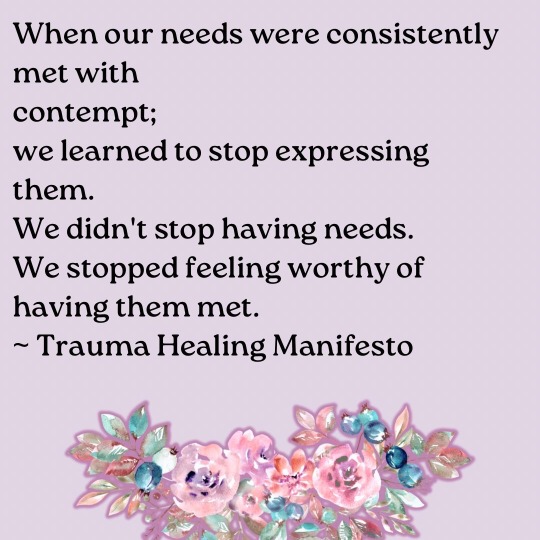
#the recovery manifesto#cptsd recovery#trauma#trauma journal#mental illness#complex ptsd#complex trauma#healing trauma#actually cptsd#dissociation#trauma therapy#mental health#cptsd life#cptsd thoughts#cptsd problems#trauma related#developmental trauma#complex post traumatic stress disorder#dissociative episode#bpd recovery#living with cptsd#cptsd awareness#cptsd warrior#cptsd healing#mental health awareness#digital art#quotes#mental health blog#mental health blogger#trauma blog
59 notes
·
View notes
Text
sorry for so many posts
Question for fellow autistics/neurodivergent folks
Does anyone else have trauma linked to their special interest? How did you handle it and heal? How do you enjoy your favorite thing safely again? It’s been years and I’m so scared. I don’t know what to do.
#autism#autistic#ASD#autistic community#autism community#neurodivergent#mental health#mental health support#autism support#trauma#trauma therapy#please help#anyone#please
29 notes
·
View notes
Text
In case no one has ever told you this before, you do actually have a future... Yes, you... I know it's hard to believe that after everything youve been through. You're so right to be angry and sad and unconsolable and at your breaking point. But there is also a version of you that is hell bent on surviving so hard, and that version of you is propelling you into a future of infinite possibilities, not all of which are there to destroy you... There are also the futures of you finding peace and serenity, carving out your own definitions of love and happiness, taking back the things they have stolen from you... There are the versions of you continuing to grow and learn and heal and making peace with your past and they are looking back at you right now with tears in their eyes from the sheer force of your power and strength... And those versions of you want you to know very much that they exist and they are there to help and cheer you on any time you need them, they are watching you so intently and they are so proud, so very very proud of how hard you are fighting... they believe in you... And that power and belief is worth fighting for 💖💕💕💕
#soft positivity#warm positivity#soft reminders#warm reminders#affirmations#positive affirmations#healing#trauma healing#inner child healing#co-regulation#nervous system#somatic healing#trauma therapy#positivity#mental health
100 notes
·
View notes
Text
Ich wünschte ich wäre endlich Tod.
#trauma#kindesmissbrauch#kindheitstraumata#bitte bleib#sorry#sterben#verlust#trauma therapy#depressiv#selbstzerstörung
8 notes
·
View notes
Text
Seeking quotes/testimonials
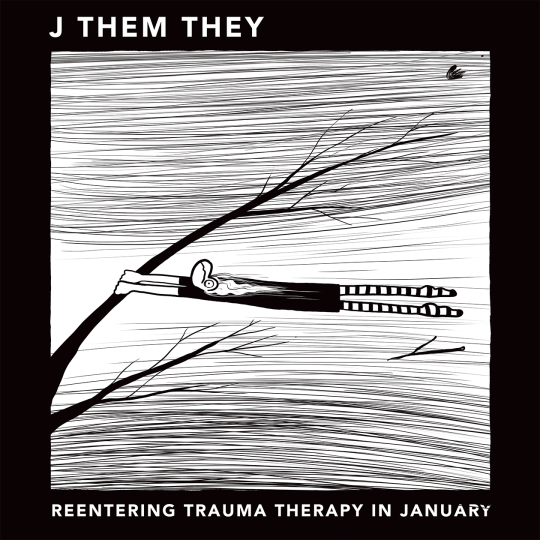

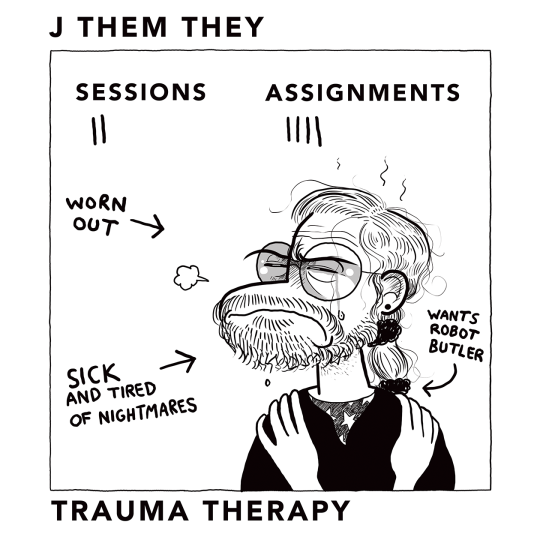
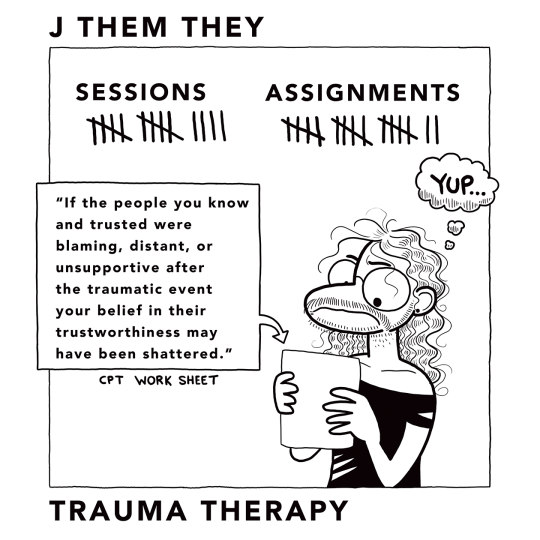
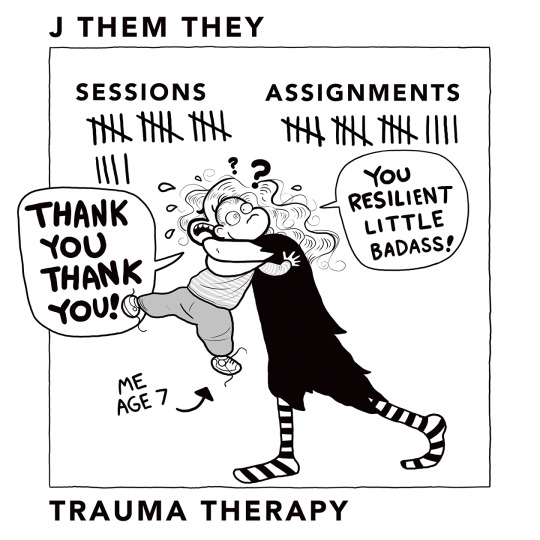
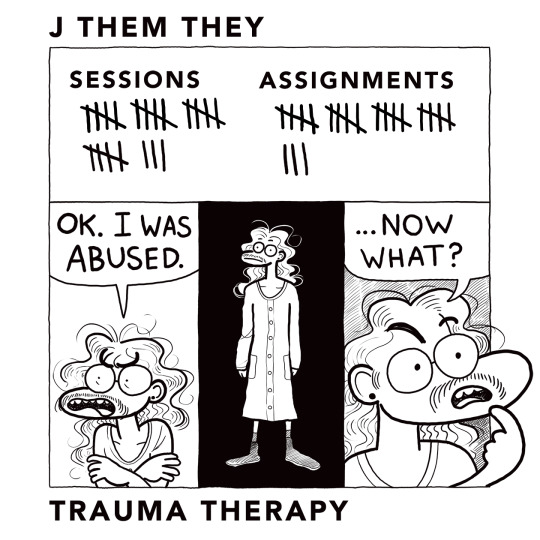
I'm taking a big swing and applying for something special.
If this series illustrating Trauma Therapy/Recovery was helpful or comforting or encouraging I'd love to hear from you. If you love my work in general that works too!
All quotes will remain anonymous. You can leave a comment, send me a message, or a Tumblr chat. Whatever is your comfort.
Please? And thank you!
#jhubbell#jthemthey#trans#transgender#nonbinary#trauma#therapy#trauma therapy#recovery#healing#cptsd#depression#ptsd#mental health#self#thank you#seeking#please share
9 notes
·
View notes
Text
I don't mean to be so mean. My head just isn't a nice place to be.
#borderline personality disorder#borderline problems#bpd problems#actually bpd#being borderline#actually borderline#actuallymentallyill#bpd#complex ptsd#bpdprobs#ptsd nightmares#actually ptsd#ptsd recovery#ptsd#post traumatic stress disorder#complex post traumatic stress disorder#trauma therapy#traumatized#trauma#autism memes#actually autism#physical disability#chronically disabled#chronic health issues#chronic pain
11 notes
·
View notes
Note
Hello! I follow you on TT and here, you are amazing, and your stories helped us a lot to finally feel seen and not so alone. We are in therapy, we are trying to have a better life. We wanted to ask you about some coping skills that can help with repressed memories, flashbacks, so, we can try to work on them, maybe you have some that you can share (if that’s okay, and you are comfortable doing that)? Also, I wanted to know… how to help other parts to be more comfortable to interact with our therapist? For now there is one part that is working with them and processing some stuff. Abbé, we can help each other with this? Thank you. And I hope you are doing okay. Take care.
Phoenix system
Hey Phoenix System! Your most recent ask is actually what made us realize that we had a ton of asks built up that we hadn't answered, so thanks for that. I'll answer this one first.
Coping skills for dealing with repressed memories, flashbacks, etc:
Inner communication. Working on inner communication when you start feeling repressed memories, emotions, flashbacks, etc, coming on is necessary. Reminding parts that they do not need to keep reliving these things anymore (you already lived it once, you don't have to keep reliving it) and that it's 2023 and you are [insert age here] now can help keep parts grounded in the present. Will discuss grounding methods shortly. Also understanding why a flashback is occurring can be helpful in order to minimize them. Because remember, you don't *have* to keep living this stuff over and over, so working on figuring out why a part is reliving things is necessary to decrease the amount of things coming out. Are they flashbacking because of an external trigger? What is that trigger and how can we avoid it? Are they flashbacking because a part triggered them internally? Why did that part trigger that part internally? What is the motive behind that? Does the part believe that they have to keep reliving their trauma purposely? Why do they believe that? Is this part sending flashbacks to send a message? Are they angry? Do they feel ignored? This is a common thing for parts to do if they feel ignored. "You don't acknowledge my pain, so I'm going to show you my pain instead." (via flashbacks). Communicating with parts why a flashback is occurring and how we can minimize them in the future is imperative for eventual healing. Getting everyone on the same page that we are now in the present and not in the past will minimize flashbacks too. Easier said than done. We have been doing this part by part for nearly three years now and while we've made a lot of progress, we still have a long way to go. It takes time.
Grounding methods. Grounding in the present is very important to minimize how "deep" into flashbacks you go. These are usually engaging your senses in your current present day world to show that you are there in the present, in 2023 (or whatever year you are reading this). For us, holding bags of ice in our hands helps keep us from floating too far into dissociation land. Looking around the room (or outside space) and pointing out all of the red objects or green objects or whatever variety of object you feel like pointing out forces you to focus on the fact you are in THAT space, not the space that your mind is trying to take you to. Eating mints or cinnamon candies is also a very good grounding method for us, sour candy too. It's a harsh taste that's hard to ignore, and it's not something we were actively tasting during our traumatic experiences, so it can help remind us that we are currently in adult time eating sour candy/mints/cinnamon candy. If anyone else who reads this has grounding methods that work for them that they'd like to share, please feel free to add to this post.
Distractions. If all else fails, finding things to distract yourself when you start feeling the thought spirals come is important. These can be things like reading a book, watching a comfort show or youtuber, doing something hands-on like art, crocheting, or even lego building, etc, is a good way to stay distracted. While it's important to recognize or try to communicate with parts to try and keep yourself from going into trauma time, sometimes a system's communication is low, or it can be difficult to reach parts because your head is like a beehive of voices. Keeping yourself distracted with things that keep you grounded in the present time will be necessary until the moment passes. Because eventually it will pass, and then you'll be more clearheaded and able to address what happened later.
Journaling/video/audio recording things that you've seen in flashbacks. Writing poetry, journaling, speaking aloud, etc helps to put words to the experiences. Putting words to the experiences often helps lessen the emotional intensity of the experiences. This is why therapy is something that helps people. Putting words to experiences can help make the emotional impact of something easier to manage. For parts who struggle to use words or type or write, drawing pictures or finding pictures online to describe the experiences helps too. Something that we try to do with parts who are having flashbacks or who try to send flashbacks to explain how much pain they are in is encouraging them to put words or images to the experiences rather than sending flashbacks to fronters to explain how much pain they are in. It helps our parts immensely to have a place dedicated to only them to express their pain. This can be via tumblr blogs (public or private, however they prefer), google docs, a journal that is only for them, a discord channel in a private system server that is only theirs, etc.
Now, for how to help parts feel more comfortable interacting with the therapist, this is twofold.
One, that part needs to be able to trust the therapist. If they don't trust the therapist, they aren't going to want to talk to them no matter how much you try to convince them. You and your therapist need to have good rapport and they need to basically be able to "prove" to that part that they are trustworthy to speak to.
Two, you then need to also convince that part that the therapist is trustworthy. Hence the need for the therapist to "prove" they are trustworthy. Remind parts that therapists have rules that they cannot tell people outside of the room you are in what you speak about. If this therapist has played by the rules of the system so far, like agreeing when to drop subjects when parts don't want to talk about something, or not pressuring parts to speak when they don't want to (a therapist should never force a part to speak to them or force parts to talk about things they aren't ready to talk about) point that out to those parts and remind them that this therapist has had good boundaries with the system in the past, so it's likely those boundaries will continue.
Lastly, it takes time for parts to feel comfortable talking to a therapist. Some parts will be okay talking but won't want to share their name or what they do in the system. If your therapist tries to pressure parts to tell them their name, their age, or what they do for the system, that's not going to create a safe environment for parts. Parts will open up only when they feel comfortable enough to, and that is something the therapist has to create.
I hope this post helped! If anyone has any further suggestions to add, feel free. :)
#did osdd#did alters#dissociative identity disorder#manybutone#did system#coping skills#coping strategies#trauma coping#trauma treatment#trauma therapy#trauma recovery#did therapy#osddid#cdd system#advice#asks#anon asks#answered asks
26 notes
·
View notes